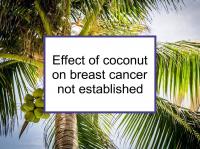Coconuts (Cocos nucifera) are high in saturated fat, which is also true of fatty cuts of meat, whole-milk dairy products, and butter, all of which are associated with higher risk of coronary disease. However, coconut oil does not have the same deleterious effects on cholesterol and risk of heart disease as animal sources of saturated fat.
In fact, lauric acid, a saturated fat that compromises approximately 50% of coconut fat, raises HDL cholesterol (the "good cholesterol) more than LDL cholesterol (the "bad" cholesterol), for a net positive effect on cholesterol profile.
Virgin coconut oil has been shown to have antifungal, antimicrobial and antioxidant properties (virgin coconut oil is produced using chilling and fermentation whereas commercial coconut oil is refined, bleached and deodorized). The antioxidant capacity of virgin coconut oil appears to be due to phenolic compounds, including ferulic acid and p-coumaric acid, although their levels are not high.
Coconut oil and cancer
Coconut oil has been shown to reduce the incidence and number of colon tumors in a rat model of colon cancer. Coconut milk incorporates kinetin riboside, a plant cytokinin that has been shown to curb the growth of multiple myeloma and is thought to have the potential to inhibit the progression of many other cancers, including prostate, colon, and liver cancer.
A 2025 study reported that different dietary fats can have varying effects on the immune system and tumor growth in obese mice. Unlike butter, beef tallow and lard, coconut oil does not alter immune cell functioning within the tumor microenvironment by creating lipid intermediates that function as harmful immunosuppressive metabolites.
Breast cancer-related effects of eating coconut
There are relatively few relevant peer-reviewed academic studies concerning coconut and breast cancer. One study found that carcinogen-induced mammary tumors in mice were reduced as much by coconut oil (which is low in omega-3 fatty acids) as by menhaden oil (which is high in omega-3 fats) compared to a high omega-6 corn oil diet.
Coconut oil is an excellent source of lauric acid, a saturated fat which has been shown to reduce proliferation and induce programmed cell death in breast cancer cells. On the other hand, approximately 18% of coconut fat is comprised of myristic acid, a saturated fat that has been linked to increased breast cancer risk in epidemiological studies. Coconut oil is also a source of palmitate, a saturated fat that has been reported to promote metastasis.
Population studies suggest coconut milk might increase risk
A 2024 Thai study reported that consuming either coconut-milk-containing curry one to three times per week or coconut milk-topped desserts four to six times per week was associated with significantly increased risk of breast cancer. Consuming half a serving of coconut milk liquid in desserts was correlated with reduced breast cancer risk.
A 2021 study concluded that relatively high circulating levels of myristic acid may increase breast cancer risk. Blood plasma level of myristic acid was found to be positively associated with risk of breast cancer; similar associations observed for both ER+ (estrogen receptor positive) and ER- breast cancer.
Two older epidemiological studies also reported associations between myristic acid or coconut milk intake and breast cancer risk. A 2009 Greek study that compared the fatty tissue of breast cancer patients and healthy women in Crete found that a high myristic acid level was associated with sharply increased breast cancer risk. A 2006 study conducted in the Philippines (which has a high rate of breast cancer compared to other Asian countries) found that women who frequently used boiling in coconut milk as a food preparation method had more than double the risk of breast cancer as those who did not.
Bottom line
Based on the available evidence, unsweetened coconut meat can be enjoyed in moderation. However, coconut cream and coconut milk should be limited due to their myristic acid content. In particular, food cooked in coconut milk (such as some yellow curries) should be limited. Coconut milk and other coconut products listing carrageenan (a potential breast carcinogen) as an ingredient or thickener should be avoided. Make sure that any canned coconut products are packaged in a BPA-free cans.
Additional comments
Raw coconut meat has a similar fat profile (in lesser amounts) as coconut oil, and also is a good source of dietary fiber and manganese. Coconut meat also contains some copper, iron and selenium. Coconut water is the clear liquid found inside coconuts. As the name implies, it is mostly water, but it is high in potassium. Coconut milk is made in a variety of ways, but typically is made from coconut water plus the output of grated coconut that has been soaked in hot water and pressed.
Sources of information provided in this webpage
The information above, which is updated continually as new research becomes available, has been developed based solely on the results of academic studies. Clicking on any of the underlined terms will take you to its tag or webpage, which contain more extensive information.
Note that while we are continually searching for new evidence specifically concerning coconut and breast cancer, there is not much interest in it among breast cancer researchers, so few directly relevant studies are available.
